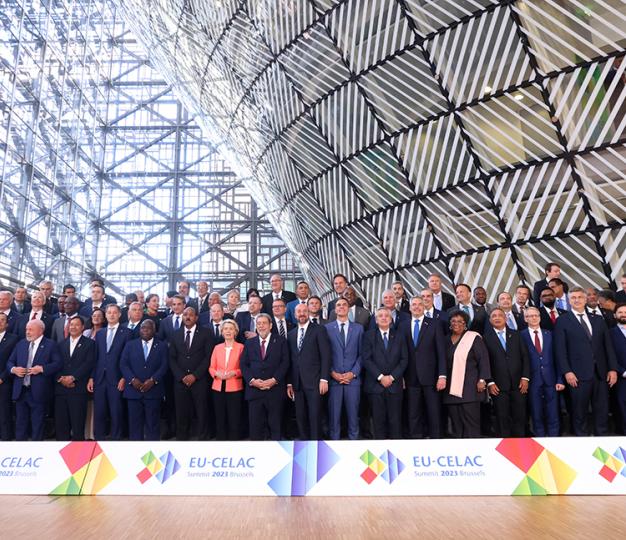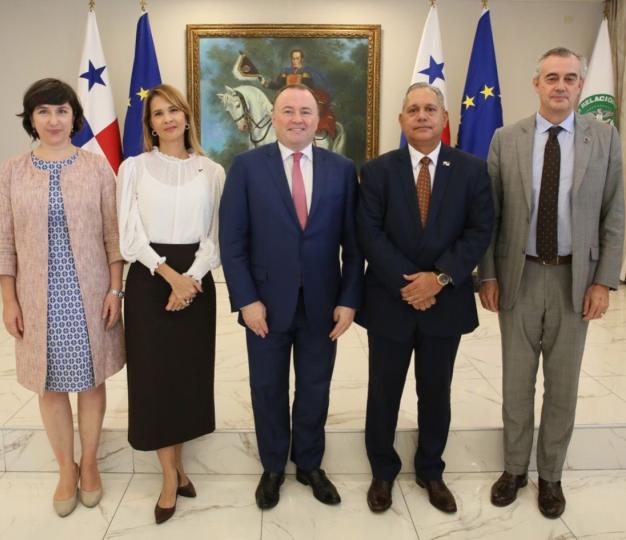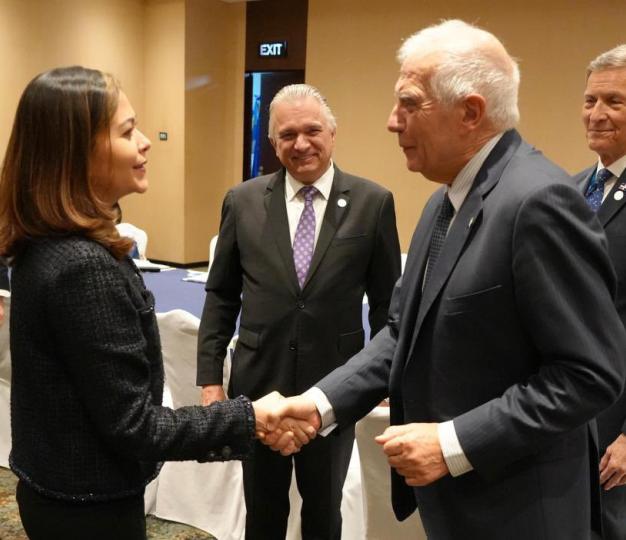Political dialogue
History of EU-Panama relations
Relations between the European Union in Panama date back to the 1990s, with the implementation of various cooperation projects, mainly focused on the promotion of economic and social development and the institutional and democratic strengthening of the state, based on the San José Dialogue of 1993.
The European Commission Liaison Office in Panama was inaugurated on 15 April 2003, and in 2018 it became a Delegation of the European Union in Panama. Read more on the milestones of EU-Panama relations.
The Delegation to Panama, as a diplomatic mission, is in charge of implementing EU’s joint foreign and security policy, manifested in the EU's Global Strategy, with view of preserving peace, strengthening international security, promoting international cooperation, as well as developing and consolidating democracy, rule of law and respect for human rights and fundamental freedoms. As a space of democracy and freedom, Panama is a key ally to the European Union.
Framework for bi-regional relations
The political relations between Panama and the EU take place within the framework of the EU-Central America Association Agreement (explanatory document) signed on 29 June 2012 in Tegucigalpa (Honduras). Panama was invited to the negotiations as an observer and became a signatory following its accession to the Secretariat for Central American Economic Integration (SIECA) in 2012.
This wide-ranging and ambitious Agreement is based on three priorities: political dialogue, cooperation and the establishment of a free trade area. While the commercial pillar of the Association Agreement was provisionally applied since 2013, the political and cooperation pillars entered into force on 1 May 2024. Previously, political relations between Panama and the EU were governed by the Political Dialogue and Cooperation Agreement, signed in 2003.
The EU-Central America Association Agreement establishes mechanisms for political dialogue to enable a permanent platform for the EU and Panama to exchange views on human rights, governance, sustainable development, climate change, democracy, gender equality, conflict prevention, combating drugs and arms trafficking, corruption and organised crime, among others.
Political relations between the EU and Panama are part of a broader EU – LAC partnership, founded on shared values and interests and strong economic, social and cultural ties. The EU-CELAC declaration, adopted by Heads of State and Government at the EU-CELAC Summit on 17-18 July 2023 in Brussels, reaffirm the commitment to work together to face the multiple crises and challenges of our times including food insecurity, poverty, inequalities, supply chain disruptions, rising inflation, the adverse effects of climate change and environmental degradation, among other. The leaders also adopted an EU-CELAC Roadmap 2023-2025.
High-level bilateral dialogue
An important step to further strengthen the engagement between the EU and Panama was taken in June 2021, when the High Representative of the Union for Foreign Affairs and Security Policy and Vice-President of the European Commission, Mr Josep Borrell, and the Minister for Foreign Affairs of Panama, Ms Erika Mouynes, signed the EU-Panama Memorandum of Understanding on Bilateral Consultations. The first round of bilateral consultations took place in Panama City on 7 December 2022 and were chaired by Vice-Minister for Foreign Affairs Vladimir A. Franco Sousa and the Managing Director for the Americas of the European Union External Action Service Brian Glynn.
In recent years, Panama has received numerous high-level visits from the EU: High Representative for Foreign Affairs, Security Policy and Vice-President of the Commission Josep Borrell (May 2022); Commissioner for International Partnerships Jutta Urpilainen (June 2022); Commissioner for Crisis Management Janez Lenarčič (October 2022); and Commissioner for Environment, Oceans and Fisheries Virginijus Sinkevičius (March 2023).
At the same time, Panama has sent high-level officials to Brussels: Vice-President José Gabriel Carrizo took part in the EU-CELAC Summit in July 2023; the Minister of Economy and Finance, Héctor Alexander, met with Commissioner McGuiness and DG FISMA in April 2023 to discuss the advances of Panama in AML/CFT; in June 2021 Minister of Foreign Affairs Mouynes held meetings with Commissioners of INTPA, MARE and ECHO; following a visit by Minister of Foreign Affairs Saint Malo in June 2018. Moreover, HR/VP Josep Borrell and Panamanian Minister of Foreign Affairs, Alejandro Ferrer, met on the margins of the UN General Assembly in 2019.
Multilateral collaboration at regional and international level
The EU advocates effective multilateralism and engages with all stakeholders, as current global challenges call for multilateral governance and rules-based international cooperation. As a country that shares the same international values and principles, Panama is a key ally within various multilateral forums, such as the United Nations and its agencies. In this sense, Panama is an international hub that serves as a seat of a number of international, regional and non-governmental organisations. Panama's international standing is further strengthened by its election as a non-permanent member of the UN Security Council in the period 2025-2026, for which the EU is providing targeted training to Panamanian diplomats.
In addition, the EU engages with Panamanian counterparts in a variety of regional meetings at different levels. It is worth mentioning the high-level informal dialogues EU-CELAC at the margins of the UN General Assembly in September 2024, or with the Alliance for Development in Democracy (ADD) in January 2024. See full list of EU-CELAC bi-regional events in 2024. Other recent examples include Security and Sargassum. On many occasions, the EU selects Panama as the seat of such international gatherings, such as the 2023 Forum for Renewable Energies or the 2024 Regional Erasmus+ Seminar.





